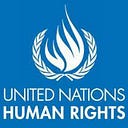Nigeria: Uncertain prospects for Boko Haram survivors
As more women and girls are freed from the violence of terror group Boko Haram, those returning to their communities do not always receive a survivor’s welcome. How can local authorities improve their reintegration into their communities and ensure their rehabilitation?
In 2013, Afra* was abducted from her home in Northeastern Nigeria by the Boko Haram insurgent group that forced her to marry one of its members. She was 13 years old. When he died a few months later, Afra was made to marry another fighter. It was only in September 2016 that she was rescued from captivity by the Nigerian military and brought to a camp for internally displaced persons.
There Afra realized that she was pregnant. Seeking the support of her family, she has since been staying with two of her sisters. But support has been slow to come: she carries the stigma of being pregnant with the child of a member of Boko Haram.
Afra’s story is typical of that of hundreds of young girls and women who have been caught up in Boko Haram’s terror campaign in the Lake Chad Basin. The future for Afra, the 82 “Chibok Girls” released in early May this year and those sharing similarly painful stories, remains uncertain.
A long journey to recovery
For the UN Special Rapporteurs on sale of children, Maud de Boer-Buquicchio, on slavery, Urmila Bhoola, and on the right to health, Dainius Pûras, “release is just a first step in the long journey of recovery and rehabilitation.”
During their joint visit to Nigeria in January 2016, these experts examined measures the Government could take to rehabilitate and reintegrate women and children survivors of Boko Haram’s captivity. Such measures, they pointed out in their report, should address root causes — especially poverty, discrimination, lack of security and deprivation, stigma, exclusion and gender inequality — that have fuelled disparities within population groups and between regions, and contributed to the rise of violent extremism.
The experts also said that rehabilitation and reintegration into their communities of women and girls freed from Boko Haram should address theirs and their communities’ immediate needs, while also aiming to fundamentally transform society for the better.
According to estimates by the UN Office for the Coordination of Humanitarian Affairs (OCHA), 8.5 million people are in dire need of life-saving aid in North-east Nigeria; 5.2 million people are threatened by famine during the months of July-August — the lean season; one million children have not been attending school; and 1.8 million people need protection from sexual and gender-based violence.
Understanding the gender dimension
Recent years have seen an increase in terrorist groups systematically subjecting women and girls to forced marriages and sexual slavery, but also using them as human shields, suicide bombers, spies, messengers, smugglers, recruiters and combatants.
Acknowledging women and girls as victims but also seeing their involvement in terrorist offences has led to the increased need to consider the gender dimensions in the global response to terrorism. The UN Security Council was the first to recognize the linkages between trafficking in persons, sexual violence and terrorism in its Resolution 2349 (2017).
This need also led the UN Human Rights Office, the UN Office on Drugs and Crime and the European Union to organize a workshop early May in Abuja, Nigeria, on the Gender Dimensions of the Criminal Justice Response to Terrorism.
During the workshop, participants — mostly legal practitioners and civil society actors — highlighted how seminal gender sensitive approaches were to investigating and prosecuting acts of terrorism. They also pointed out the need for gender-sensitive training for law enforcement officers; the enforcement of legislation with a gender lens; the sensitization of victims about their rights and how to claim them; as well as the remedies and protection afforded to those who choose to come forward.
What the future holds
As some participants pointed out, “for some of these victims, [captivity] is the only reality they know and have experienced. Education and self-esteem of women and girls, men and boys is crucial to redress inequalities in the region.”
Education has proven to be an essential means to empower women and girls as active participants in the fight against terrorism, and in efforts to provide remedies, recovery, and rehabilitation for victims. Education also helps communities to counter the stigma faced by women and girls who have been subject to crimes such as sexual violence and forced marriage.
Some of the girls who escaped abduction by Boko Haram in Nigeria have started speaking out. Their plea is unequivocal: “every child needs to be educated and go to school.” Rachel*, who is now back in school, is one of these girls.
“My dream is to be a medical doctor in the future and inspire others and go back to my home country and help those kids to go back to school and assist others get the education they deserve,” said Rachel, whose father and three younger brothers were killed by Boko Haram terrorists.
*Real names have been changed to protect the victims’ identities.
